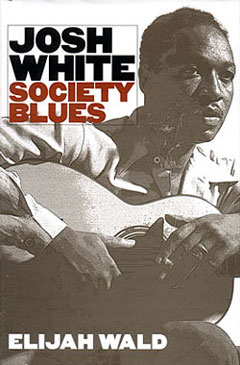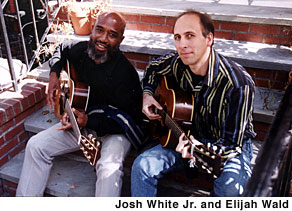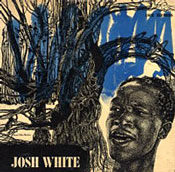Elijah Wald – Josh White: Society Blues
Josh
White photo archive
Josh White album
Society Blues reviews and interviews
Josh White and the Protest Blues article
 Josh White: Society Blues
Josh White: Society Blues
University of Massachusetts Press (hardcover, 2000)
Routledge (paperback, 2002)
Winner: Independent Publisher's Award as "Best Book on Performing Arts"
"I learned things about Josh White from this detailed biography that I never knew. Elijah Wald has done a fine job. This is a more complete and fair book than I would have believed possible." -- Pete Seeger
"Complete,
well written, and in-depth. Highly recommended."
-- Library Journal
"Wald deftly describes White's repertoire and that of his
contemporaries, giving an immediacy to the music culture that
surrounded him. The reader follows White as he maneuvers through the
complexities of race, politics, and popular music. With White as its
focal point, Society Blues provides a glimpse of the interaction between twentieth-century American society and its vernacular musics... that lucky combination of a writer who knows his
topic, knows what story he wants to tell, and possesses the tools to
tell that story."
--Tod Harvey, The Journal of American Folklore
Josh White’s life is the history of black American music finding a white audience, of folk music and the American left, and of a man who remade himself time and time again, fighting discrimination, stereotypes, and his own personal demons to become one of the world’s most successful black entertainers, then maintaining himself in that position through four decades. Josh was hailed at various times as king of the blues singers, king of the folksingers, king of the political singers, pioneering black sex symbol, "Presidential Minstrel" to the Roosevelt White House, and king of Cafe Society.
Josh’s life intersected some of the most exciting periods in American culture. In the 1920s, he was leading legendary blind blues singers around the South, and became the youngest soloist in the "race records" market. In the 1930s, he was a blues star, more popular than Robert Johnson and influencing a generation of Southern players. In the 1940s, he discovered a white, New York audience, appearing alongside jazz figures like Billie Holiday, and becoming so popular in the folk world that Pete Seeger would look up to him as "Mr. Folk Music." His recording of "One Meat Ball" was a folk-pop smash, and he became one of the few black figures to star on Broadway and appear in Hollywood films, the only black guitarist to have his own national tour, and a daring sex symbol with adoring fans on both sides of the color line.
In the 1950s, Josh conquered Europe, then saw his achievements collapse in the polarized political ferment of the McCarthy era. Attempting to strike a balance that would keep his career afloat, he instead succeeded in alienating both political camps, declaring that he had been "a sucker for the Communists," while maintaining his outspoken stance on civil rights. A star in England, he was the forgotten man at home. By the end of the decade, however, the folk revival had hit and he was climbing back to the top. By 1963, the height of the folk revival, he was ranked as America’s third most popular folksinger, after Harry Belafonte and Pete Seeger but ahead of Bob Dylan, and was a featured performer at Martin Luther King’s March on Washington. At his death in 1969, he was the best-known folk-blues artist in America.
 This book, his first full-scale biography, traces Josh’s
journey from the "colored" side of Greenville, South Carolina, to the
heights of Manhattan society. It explores the complexities of his
music, his political involvements, and his rather gaudy personal life,
providing a critical and affectionate portrait of one of America’s
defining entertainers. It was done with the full cooperation and help
of the White family.
This book, his first full-scale biography, traces Josh’s
journey from the "colored" side of Greenville, South Carolina, to the
heights of Manhattan society. It explores the complexities of his
music, his political involvements, and his rather gaudy personal life,
providing a critical and affectionate portrait of one of America’s
defining entertainers. It was done with the full cooperation and help
of the White family.
Quotations About Society Blues:
"Although he is clearly an admirer of White, [Wald] manages to balance his fondness for his subject with a careful assessment of strengths and failures. This is an estimable achievement, considering the challenge a complex figure such as White presents for any biographer. . . . Now there are signs of a Josh White revival [and] this affectionate, careful biography will serve as a useful guide." --THE WASHINGTON POST
"Wald’s well written and deeply researched biography of Josh White is the best book on American music I’ve read in years (and I’ve read a lot of them). Anyone interested in the development of our popular music can’t afford to miss it." --DAVE VAN RONK
 Links
to Reviews and Interviews:
Links
to Reviews and Interviews:
Christopher Lydon interviews Elijah Wald on "The Connection"
Visit my archive of mostly unpublished Josh White Photos and Memorabilia
Also check out the Josh White album "Free and Equal Blues," on my Music and Albums page, and my article on Josh White and Protest Music, from Living Blues Magazine.
And there is a German web page with an excellent, illustrated Josh White discography, as well as a great deal of other folk revival material.